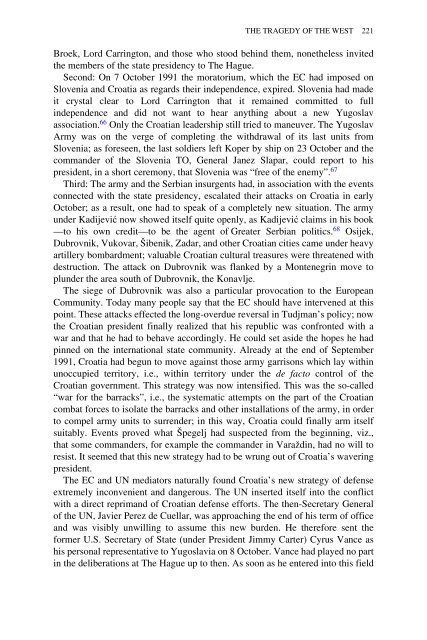Yugoslavia: A History of its Demise - Indymedia
Yugoslavia: A History of its Demise - Indymedia
Yugoslavia: A History of its Demise - Indymedia
Create successful ePaper yourself
Turn your PDF publications into a flip-book with our unique Google optimized e-Paper software.
THE TRAGEDY OF THE WEST 221<br />
Broek, Lord Carrington, and those who stood behind them, nonetheless invited<br />
the members <strong>of</strong> the state presidency to The Hague.<br />
Second: On 7 October 1991 the moratorium, which the EC had imposed on<br />
Slovenia and Croatia as regards their independence, expired. Slovenia had made<br />
it crystal clear to Lord Carrington that it remained committed to full<br />
independence and did not want to hear anything about a new Yugoslav<br />
association. 66 Only the Croatian leadership still tried to maneuver. The Yugoslav<br />
Army was on the verge <strong>of</strong> completing the withdrawal <strong>of</strong> <strong>its</strong> last un<strong>its</strong> from<br />
Slovenia; as foreseen, the last soldiers left Koper by ship on 23 October and the<br />
commander <strong>of</strong> the Slovenia TO, General Janez Slapar, could report to his<br />
president, in a short ceremony, that Slovenia was “free <strong>of</strong> the enemy”. 67<br />
Third: The army and the Serbian insurgents had, in association with the events<br />
connected with the state presidency, escalated their attacks on Croatia in early<br />
October; as a result, one had to speak <strong>of</strong> a completely new situation. The army<br />
under Kadijević now showed <strong>its</strong>elf quite openly, as Kadijević claims in his book<br />
—to his own credit—to be the agent <strong>of</strong> Greater Serbian politics. 68 Osijek,<br />
Dubrovnik, Vukovar, Šibenik, Zadar, and other Croatian cities came under heavy<br />
artillery bombardment; valuable Croatian cultural treasures were threatened with<br />
destruction. The attack on Dubrovnik was flanked by a Montenegrin move to<br />
plunder the area south <strong>of</strong> Dubrovnik, the Konavlje.<br />
The siege <strong>of</strong> Dubrovnik was also a particular provocation to the European<br />
Community. Today many people say that the EC should have intervened at this<br />
point. These attacks effected the long-overdue reversal in Tudjman’s policy; now<br />
the Croatian president finally realized that his republic was confronted with a<br />
war and that he had to behave accordingly. He could set aside the hopes he had<br />
pinned on the international state community. Already at the end <strong>of</strong> September<br />
1991, Croatia had begun to move against those army garrisons which lay within<br />
unoccupied territory, i.e., within territory under the de facto control <strong>of</strong> the<br />
Croatian government. This strategy was now intensified. This was the so-called<br />
“war for the barracks”, i.e., the systematic attempts on the part <strong>of</strong> the Croatian<br />
combat forces to isolate the barracks and other installations <strong>of</strong> the army, in order<br />
to compel army un<strong>its</strong> to surrender; in this way, Croatia could finally arm <strong>its</strong>elf<br />
suitably. Events proved what Špegelj had suspected from the beginning, viz.,<br />
that some commanders, for example the commander in Varaždin, had no will to<br />
resist. It seemed that this new strategy had to be wrung out <strong>of</strong> Croatia’s wavering<br />
president.<br />
The EC and UN mediators naturally found Croatia’s new strategy <strong>of</strong> defense<br />
extremely inconvenient and dangerous. The UN inserted <strong>its</strong>elf into the conflict<br />
with a direct reprimand <strong>of</strong> Croatian defense efforts. The then-Secretary General<br />
<strong>of</strong> the UN, Javier Perez de Cuellar, was approaching the end <strong>of</strong> his term <strong>of</strong> <strong>of</strong>fice<br />
and was visibly unwilling to assume this new burden. He therefore sent the<br />
former U.S. Secretary <strong>of</strong> State (under President Jimmy Carter) Cyrus Vance as<br />
his personal representative to <strong>Yugoslavia</strong> on 8 October. Vance had played no part<br />
in the deliberations at The Hague up to then. As soon as he entered into this field
















